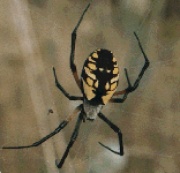Difference between revisions of "Spider"
m (Text replace - "== Authority ==" to "== Sources Checked for Data in Record ==") |
|||
| (4 intermediate revisions by the same user not shown) | |||
| Line 1: | Line 1: | ||
[[File:image4_spider.jpg|thumb|Spider]] | [[File:image4_spider.jpg|thumb|Spider]] | ||
== Description == | == Description == | ||
| + | [[File:Spider-poop.jpg|thumb|Spider excrement<br>Image from Colonial Pest at [https://www.colonialpest.com/2014/03/20/how-to-clean-up-spider-droppings/ spider droppings]]] | ||
| + | An arthropod member of the order of Arachnida. Spiders are distinct from insects in that they have eight legs (not 6) and a two-part body (not 3). About 50,000 species of spiders exist with some on every continent in the world. Spiders spin a strong [http://cameo.mfa.org/materials/fullrecord.asp?name=spider%20silk silk] thread as a snare for their prey. They feed almost entirely on insects. The presence of spiders in a storage area usually indicates that insects are also present. Spiders do not pose major dangers to artifacts themselves, however, their droppings can be detrimental to artifacts. Spider excrement usually have a thick consistency in a highly viscous liquid form that contains uric acid. The tiny splatters will quickly dry making it more difficult to remove. The droppings usually occur near their cobwebs. | ||
| − | + | == Physical and Chemical Properties == | |
| − | + | *. Simon Moore, Comment from ConsDistList Global Conservation Forum, August 3, 2023. | |
| − | |||
| − | |||
* Random House, ''Webster's Encyclopedic Unabridged Dictionary of the English Language'', Grammercy Book, New York, 1997 | * Random House, ''Webster's Encyclopedic Unabridged Dictionary of the English Language'', Grammercy Book, New York, 1997 | ||
| − | |||
* ''The American Heritage Dictionary'' or ''Encarta'', via Microsoft Bookshelf 98, Microsoft Corp., 1998 | * ''The American Heritage Dictionary'' or ''Encarta'', via Microsoft Bookshelf 98, Microsoft Corp., 1998 | ||
| − | + | * ''Encyclopedia Britannica'', http://www.britannica.com Comment: 'spider' [Accessed February 26, 2002]. | |
| − | * ''Encyclopedia Britannica'', http://www.britannica.com Comment: 'spider' | + | * Wikipedia: [https://en.wikipedia.org/wiki/Spider Spider] Accessed July 2023 |
| − | |||
[[Category:Materials database]] | [[Category:Materials database]] | ||
Latest revision as of 09:25, 4 August 2023
Description
An arthropod member of the order of Arachnida. Spiders are distinct from insects in that they have eight legs (not 6) and a two-part body (not 3). About 50,000 species of spiders exist with some on every continent in the world. Spiders spin a strong silk thread as a snare for their prey. They feed almost entirely on insects. The presence of spiders in a storage area usually indicates that insects are also present. Spiders do not pose major dangers to artifacts themselves, however, their droppings can be detrimental to artifacts. Spider excrement usually have a thick consistency in a highly viscous liquid form that contains uric acid. The tiny splatters will quickly dry making it more difficult to remove. The droppings usually occur near their cobwebs.
Physical and Chemical Properties
- . Simon Moore, Comment from ConsDistList Global Conservation Forum, August 3, 2023.
- Random House, Webster's Encyclopedic Unabridged Dictionary of the English Language, Grammercy Book, New York, 1997
- The American Heritage Dictionary or Encarta, via Microsoft Bookshelf 98, Microsoft Corp., 1998
- Encyclopedia Britannica, http://www.britannica.com Comment: 'spider' [Accessed February 26, 2002].
- Wikipedia: Spider Accessed July 2023

